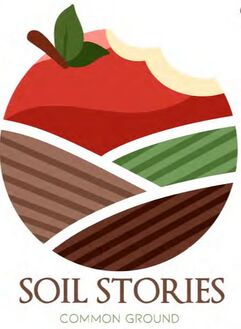
Firefly Farms: Creating Community and Seeking Communion with Earth
by: Pettyjohn
When I arrived at Firefly Farms, a local farm in Wichita, Kansas, Leah Dannar-Garcia stood by the driveway, smiling and waving as I exited my car and followed her into the fieldhouse. She hurried to lay her harvested carrots in a plastic crate, letting them settle so she could store them in a climate-controlled room. Hurrying to finish her work so we could start our interview, she offered me a bundle with a large smile and filled a bag with carrots. After she completed her work, she invited me into her book-filled house and we began to talk, sitting on the couch in the living room.
Leah is a specialty crop farmer, which she describes as farmers who farm “all the crops except commodity crops. Commodity crops are corn, wheat, soybean, those types of crops and cotton. Specialty crops are kind of a catchphrase to describe anything that is not those things. Specialty crops, especially in our area, tend to be grown in much smaller quantities, typically by people called ‘market farmers.’ Market farmers are farmers who grow specialty crops, fruits and vegetables and nuts are part of that, and they sell them at farmers’ markets. Actually, my farm is a little unique. When I got into the business five years ago, I did not want to go to farmers’ markets, I didn’t enjoy them, so I wanted to move a lot of product really quickly.” Instead, she sells her locally grown ingredients directly to local restaurants, calling directly to offer her crops, and she was one of the earliest local farmers to do that.
When she sold to local restaurants, she began “farm-to-table dinners.” Leah noted that these events were important for her farm: “I thought, ‘Why don’t we recruit one of these chefs I’m always working with and have them come out to the farm and have a farm-to-table dinner?’ I tend to think a lot about building community because I think people are hungry for connection and community. What I found was that these chefs were very isolated in their own restaurants and I thought that was kind of sad, so I wanted to grow community among that group of people. When I originally envision those farm-to-table dinners, it was to promote my own farm and my own fruits and vegetables and to showcase the chefs working with me, and then I showcased several of the other farms that were working in our area and that felt really right to me. My mantra for, at least two or three years, was that ‘rising tides raise all boats.’” Her least favorite part of farming is the business side, though.
Instead, Leah finds that her favorite parts of farming have been the parts where she is involved with the soil, the plants, and the entire ecosystem: “I like pruning the plants and taking care of them. My favorite part is the daily walk. So, what I try to do every day before I start doing things is, I try to just walk and observe, which, if you’re doing things, its really hard to observe. I try to get a cup of iced coffee and walk around the fields and see what I see. Two years ago, we put bluebird boxes up so in the early mornings, the bluebirds are out. They’re our insect eaters, as are our barn swallows and our quail. Once we went organic, what started happening is the spiders started coming back into the garden and the whole ecosystem developed, which was really exciting to me. When we were, for a number of years, gardeners before we started the business, and we were traditional gardeners. We used some chemicals, and I would never see a spider in the garden. If you see a spider, it’s not a bad thing, except maybe spider mites. Most spiders, though, really the vast majority of them are good. Almost immediately when we stopped using chemicals the very first year, what I started noticing is how the spiders came back to the garden and then, I remember very distinctly that I’d been out in the garden, and I’d flushed a little flock of birds out of the garden and I thought, ‘Oh! They’re going to peck my tomatoes,’ so I went, ‘Shoo! Shoo!’ and thought, ‘Well, this isn’t good,’ and ‘Why’s this happening?’ The next day I went out, and I was down on my hands and knees and the little birds didn’t even see me, and my epiphany was that they were eating the hornworms and little pest insects. And it just delighted me that year to see the spiders and birds come back!”
Leah’s farm is not the large farm manned by tractors and machinery. It is much smaller, having to limit what can be grown due to the space and time available to her and her co-farmers, but she is passionate and caring for the earth she farms. She cares about her plants and her land and her tenacity for farming can be seen by the smile on her face as she goes about her work and describes it. For Leah Dannar-Garcia, farming is more than merely food-it is community with Wichita and community with the earth.
Works Cited
Dannar-Garcia, Leah. Interview with Leah Dannar-Garcia, November 22, 2019.
by: Pettyjohn
When I arrived at Firefly Farms, a local farm in Wichita, Kansas, Leah Dannar-Garcia stood by the driveway, smiling and waving as I exited my car and followed her into the fieldhouse. She hurried to lay her harvested carrots in a plastic crate, letting them settle so she could store them in a climate-controlled room. Hurrying to finish her work so we could start our interview, she offered me a bundle with a large smile and filled a bag with carrots. After she completed her work, she invited me into her book-filled house and we began to talk, sitting on the couch in the living room.
Leah is a specialty crop farmer, which she describes as farmers who farm “all the crops except commodity crops. Commodity crops are corn, wheat, soybean, those types of crops and cotton. Specialty crops are kind of a catchphrase to describe anything that is not those things. Specialty crops, especially in our area, tend to be grown in much smaller quantities, typically by people called ‘market farmers.’ Market farmers are farmers who grow specialty crops, fruits and vegetables and nuts are part of that, and they sell them at farmers’ markets. Actually, my farm is a little unique. When I got into the business five years ago, I did not want to go to farmers’ markets, I didn’t enjoy them, so I wanted to move a lot of product really quickly.” Instead, she sells her locally grown ingredients directly to local restaurants, calling directly to offer her crops, and she was one of the earliest local farmers to do that.
When she sold to local restaurants, she began “farm-to-table dinners.” Leah noted that these events were important for her farm: “I thought, ‘Why don’t we recruit one of these chefs I’m always working with and have them come out to the farm and have a farm-to-table dinner?’ I tend to think a lot about building community because I think people are hungry for connection and community. What I found was that these chefs were very isolated in their own restaurants and I thought that was kind of sad, so I wanted to grow community among that group of people. When I originally envision those farm-to-table dinners, it was to promote my own farm and my own fruits and vegetables and to showcase the chefs working with me, and then I showcased several of the other farms that were working in our area and that felt really right to me. My mantra for, at least two or three years, was that ‘rising tides raise all boats.’” Her least favorite part of farming is the business side, though.
Instead, Leah finds that her favorite parts of farming have been the parts where she is involved with the soil, the plants, and the entire ecosystem: “I like pruning the plants and taking care of them. My favorite part is the daily walk. So, what I try to do every day before I start doing things is, I try to just walk and observe, which, if you’re doing things, its really hard to observe. I try to get a cup of iced coffee and walk around the fields and see what I see. Two years ago, we put bluebird boxes up so in the early mornings, the bluebirds are out. They’re our insect eaters, as are our barn swallows and our quail. Once we went organic, what started happening is the spiders started coming back into the garden and the whole ecosystem developed, which was really exciting to me. When we were, for a number of years, gardeners before we started the business, and we were traditional gardeners. We used some chemicals, and I would never see a spider in the garden. If you see a spider, it’s not a bad thing, except maybe spider mites. Most spiders, though, really the vast majority of them are good. Almost immediately when we stopped using chemicals the very first year, what I started noticing is how the spiders came back to the garden and then, I remember very distinctly that I’d been out in the garden, and I’d flushed a little flock of birds out of the garden and I thought, ‘Oh! They’re going to peck my tomatoes,’ so I went, ‘Shoo! Shoo!’ and thought, ‘Well, this isn’t good,’ and ‘Why’s this happening?’ The next day I went out, and I was down on my hands and knees and the little birds didn’t even see me, and my epiphany was that they were eating the hornworms and little pest insects. And it just delighted me that year to see the spiders and birds come back!”
Leah’s farm is not the large farm manned by tractors and machinery. It is much smaller, having to limit what can be grown due to the space and time available to her and her co-farmers, but she is passionate and caring for the earth she farms. She cares about her plants and her land and her tenacity for farming can be seen by the smile on her face as she goes about her work and describes it. For Leah Dannar-Garcia, farming is more than merely food-it is community with Wichita and community with the earth.
Works Cited
Dannar-Garcia, Leah. Interview with Leah Dannar-Garcia, November 22, 2019.
